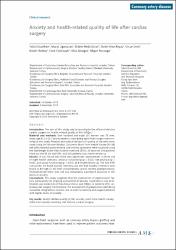| dc.contributor.author | Güzelhan, Yalçın | |
| dc.contributor.author | Uğurlucan, Murat | |
| dc.contributor.author | Öztaş, Didem Melis | |
| dc.contributor.author | Beyaz, Metin Onur | |
| dc.contributor.author | Ünal, Orçun | |
| dc.contributor.author | Bektaş, Nilüfer | |
| dc.contributor.author | Conkbayır, Cenk | |
| dc.contributor.author | Alpagut, Ufuk | |
| dc.contributor.author | Bozbuğa, Nilgün | |
| dc.date.accessioned | 2021-04-02T10:21:48Z | |
| dc.date.available | 2021-04-02T10:21:48Z | |
| dc.date.issued | 2020 | en_US |
| dc.identifier.citation | Güzelhan, Y., Uğurlucan, M., Öztaş, D. M., Beyaz, M. O., Ünal, O., Bektaş, N. ... Bozbuğa, N. (2020). Anxiety and health-related quality of life after cardiac surgery. Archives of Medical Science - Atherosclerotic Diseases, 5, e27-e35. https://dx.doi.org/10.5114/amsad.2020.94376 | en_US |
| dc.identifier.issn | 2451-0629 | |
| dc.identifier.uri | https://dx.doi.org/10.5114/amsad.2020.94376 | |
| dc.identifier.uri | https://hdl.handle.net/20.500.12511/6677 | |
| dc.description.abstract | Introduction: The aim of this study was to investigate the effect of elective cardiac surgery on health-related quality of life (HRQoL). Material and methods: One hundred and eight (35 women and 73 men, mean age 62.3 ±12.7 years) patients undergoing open heart surgery were enrolled in the study. Physical and mental domains of quality of life were measured using the 36-item Medical Outcomes Short-Form Health Survey (SF-36) self-administered questionnaire, and anxiety symptoms were assessed using the Spielberger State-Trait Anxiety Inventory (STAI). At baseline 108 patients filled out the SF-36 and STAI, and 102 patients at 6-month follow-up. Results: It was found that there was significant improvement in three out of eight health domains: physical functioning (p < 0.02), role physical (p < 0.01), and social functioning (p < 0.04), at 6-month follow-up. The two STAI sub-scores: the State Anxiety Inventory and the Trait Anxiety Inventory were found to be high (≥ 40) both preoperatively and 6 months postoperatively. Postoperatively there was not any statistically significant decrease in the levels of anxiety. Conclusions: This study suggests that the assessment of psychosocial factors, particularly the ongoing assessment of anxiety, could help in risk stratification and prediction of functional status and HRQoL in patients after cardiovascular surgery. Furthermore, the assessment of preoperative well-being should be integrated in routine care in order to identify and support patients with higher levels of anxiety. | en_US |
| dc.language.iso | eng | en_US |
| dc.publisher | Termedia Publishing House Ltd. | en_US |
| dc.rights | info:eu-repo/semantics/embargoedAccess | en_US |
| dc.subject | Health-Related Quality of Life | en_US |
| dc.subject | Anxiety | en_US |
| dc.subject | Short-Form Health Survey | en_US |
| dc.subject | State-Trait Anxiety Inventory | en_US |
| dc.subject | Risk Factors | en_US |
| dc.subject | Cardiac Surgery | en_US |
| dc.title | Anxiety and health-related quality of life after cardiac surgery | en_US |
| dc.type | article | en_US |
| dc.relation.ispartof | Archives of Medical Science - Atherosclerotic Diseases | en_US |
| dc.department | İstanbul Medipol Üniversitesi, Tıp Fakültesi, Cerrahi Tıp Bilimleri Bölümü, Kalp ve Damar Cerrahisi Ana Bilim Dalı | en_US |
| dc.authorid | 0000-0001-6643-9364 | en_US |
| dc.authorid | 0000-0001-9338-8152 | en_US |
| dc.identifier.volume | 5 | en_US |
| dc.identifier.startpage | e27 | en_US |
| dc.identifier.endpage | e35 | en_US |
| dc.relation.publicationcategory | Makale - Uluslararası Hakemli Dergi - Kurum Öğretim Elemanı | en_US |
| dc.identifier.doi | 10.5114/amsad.2020.94376 | en_US |


















